'Fear always makes you an accomplice,' Zelenskiy warns
Wrapping up his late-night address, Zelenskiy urged other countries to act with courage.
Ukrainians should not die just because someone cannot find enough courage to hand over the necessary weapons to Ukraine.
Fear always makes you an accomplice.
If someone is afraid of Russia, if he or she is afraid to make the necessary decisions that are important to us, in particular for us to get planes, tanks, necessary artillery, shells, it makes these people responsible for the catastrophe created by Russian troops in our cities, too.
Because if you could save, you had to save.”
Summary
It is approaching 7am in Ukraine in the second month of the war in Ukraine.
Here is a comprehensive rundown on where the situation currently stands:
- Face-to-face peace talks between Ukraine and Russia are likely to start in Turkey today after negotiators arrived in Istanbul for their first face-to-face peace talks in more than two weeks. Both sides have played down the chances of a major breakthrough and a senior US official said Vladimir Putin did not appear ready to compromise.
- Ukraine’s president Volodymyr Zelenskiy said in his nightly address that he had had a “very active diplomatic day” after speaking with British prime minister Boris Johnson, Canadian prime minister Justin Trudeau, German chancellor Olaf Scholz, Italian prime minister Mario Draghi and the president of Azerbaijan Ilham Aliyev.
- Zelenskiy also urged for sanctions packages to be “effective and substantial” and called for countries to keep supplying weapons to Ukraine. “Ukrainians should not die just because someone cannot find enough courage to hand over the necessary weapons to Ukraine,” he said. “Fear always makes you an accomplice.”
- Kremlin spokesman Dmitry Peskov said Russia feels it is “amongst war” with the west after an array of sanctions were imposed on Russian businesses and individuals. Referencing Russia’s ongoing tension with Nato, Peskov told broadcaster PBS: “For a couple of decades, we were telling the collective west that we are afraid of your Nato’s moving eastwards. We too are afraid of Nato getting closer to our borders with its military infrastructure. Please take care of that. Don’t push us into the corner. No.”
- Peskov added “no one is thinking about using” or “even about [the] idea of using a nuclear weapon”.
- Russian billionaire Roman Abramovich and a Ukrainian peace negotiator suffered symptoms consistent with poisoning earlier this month, according to a source with direct knowledge of the incident. Abramovich was taking part in informal peace negotiations in the Ukrainian capital, Kyiv, early in March when he began to feel ill, the source told the Guardian. Ukrainian MP Rustem Umerov was also part of the negotiation.
- UK military intelligence says that Russia is expected to send more than 1,000 mercenaries into eastern Ukraine as they continue to suffer heavy losses. Russia’s private military company, the Wagner group, has already deployed to eastern Ukraine and is expected to send more than 1,000 mercenaries, including senior officials in the organisation, according to the Ministry of Defence.
- Kyiv sees no signs on the ground that Russia has given up a plan to surround the Ukrainian capital, Ukrainian defence ministry spokesperson Oleksander Motuzyanyk said. “For now we don’t see the movement of enemy forces away from Kyiv,” he said in a televised briefing. Ukraine’s general staff of the armed forces claimed Russian troops are “weakened, disoriented” and “cut off from logistics and the main forces”.
- Ukrainian forces have seized back full control of the town of Irpin, a few miles from Kyiv. The area’s mayor, Oleksandr Markushyn. said Irpin had been “liberated” and that Russian soldiers were “offering to surrender”. The United States cannot confirm who is in control of the city of Irpin, a senior US defence official said.
- Russian soldiers who seized the site of the Chernobyl nuclear disaster drove unprotected through a highly toxic zone called the “Red Forest”, kicking up clouds of radioactive dust, Chernobyl workers told Reuters. The two sources said they had witnessed Russian tanks and other armoured vehicles moving through the Red Forest, which is the most radioactively contaminated part of the zone around Chernobyl.
- Almost 5,000 people, including about 210 children, have been killed in the devastated city of Mariupol since Russia invaded Ukraine last month, a spokesperson for the mayor said. Vadym Boichenko said Mariupol was on the verge of a humanitarian catastrophe and must be completely evacuated, with about 160,000 civilians were trapped in the city without power.
- Ukraine’s economy minister, Yulia Svyrydenko, said the war has so far cost the country $564.9bn (£429.3bn) in terms of damage to infrastructure, lost economic growth and other factors. Eight thousand kilometres (4,970 miles) of roads and 10m sq metres of housing have been damaged or destroyed as a result of fighting, she said in an online post.
- Video footage purporting to show the torture of Russian prisoners of war is being investigated by the Ukrainian government. The film, which has not been verified, appears to show Ukrainian soldiers removing three hooded Russians from a van before shooting them in the legs.
- US president Joe Biden said he will “make no apologies” after appearing to call for Putin’s removal last week. When asked by a reporter if he regretted saying that Putin should not remain in power, Biden said: “I wasn’t then, nor am I now, articulating a policy change. I was expressing moral outrage that I felt.”
- Britain’s foreign secretary, Liz Truss, accused Putin’s forces of abducting innocent civilians, describing the move as an “abhorrent tactic” after Ukrainian human rights group, ZMINA, claimed to have identified dozens of individuals who had been abducted, with thousands more deported to Russia.
Updated
Earlier, Ukrainian president Volodymyr Zelenskiy said his people should not die just because someone cannot find enough courage to hand over the necessary weapons to Ukraine.
“Fear always makes you an accomplice”, he said. ‘If someone is afraid of Russia ... it makes these people responsible for the catastrophe created by Russian troops in our cities, too”.
Zelenskiy was lost for words at the thought that some countries were waiting for Russia to use chemical weapons before putting an embargo on Russia oil exports. “Waiting for chemical weapons”, he said. “We, living people, have to wait? Doesn’t everything that the Russian military is doing and has already done deserve an oil embargo?”
Thousands of Ukrainians continue to use subway stations as makeshift bomb shelters.
Many sleep just inches away from railway tracks.
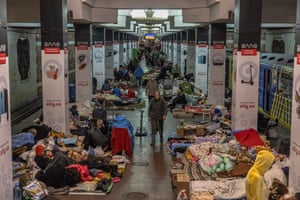
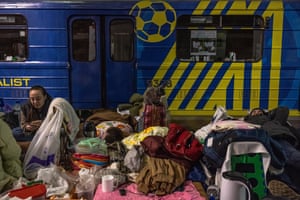
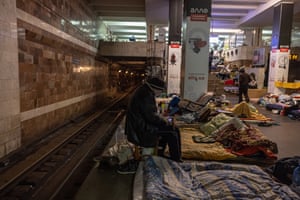
'Don’t push us into the corner' Kremlin spokesperson warns
Peskov described recent sanctions as a war against Russia in trade.
Unfortunately, those conditions, they are quite unfriendly. And they are enemy, enemy-like for us. We entered the phase, the phase of a total war. And we in Russia, we will feel ourselves amongst war, because Western European countries, United States, Canada, Australia, they actually — they actually — they are leading war against us in trade, in economy, in seizing our properties, in seizing our funds, in blocking our financial relations.
And we have to adapt ourselves to new reality. You have to understand Russia. You have to understand Russia.”
Referencing Russia’s ongoing tension with Nato, Peskov said:
For a couple of decades, we were telling the collective west that we are afraid of your Nato’s moving eastwards. We too are afraid of Nato getting closer to our borders with its military infrastructure. Please take care of that. Don’t push us into the corner. No.
Now we said, listen, guys, we are not happy with this coup in Ukraine. And you have guarantees by Poland, by France and by Germany. You would probably remember the document with the signatures of the relevant foreign ministers. No reaction.
Then, we said, listen, guys, we’re not happy with the possibility of Ukraine’s getting into Nato, because it will endanger us additionally, and it will ruin the balance of mutual deterrence in Europe. No reaction.
Then we said, listen, guys, we want equal relationship. We want to take into account each other’s concerns. If you don’t into account our concerns, then we will be a little bit nervous. No reaction completely.”
Regarding the possible stalemate emerging in Russia’s supply of gas to Europe after Vladimir Putin said he wants payment in rubles, Kremlin spokesman Dmitry Peskov said Russia is not “going to make a charity out of it”.
PBS reporter Ryan Chilcote said it “looks like we have a stalemate here” and asked: “Will Russia turn off the tap? Will it cut off its gas exports to Europe if those countries refuse to pay for that gas in rubles?”
Peskov replied: “I don’t know what is going to happen when they reject this possibility.
So, as soon as we have the final decision, we will look what can be done. But, definitely, we are not going to make a charity out of it and to send gas free of charge to Western Europe.”
When continued to be pressed, Peskov added: “No payment, no gas.”
Kremlin spokesman Dmitry Peskov has said “no one is thinking about using” or “even about [the] idea of using a nuclear weapon” in an interview with PBS on Monday evening.
Reporter Ryan Chilcote asked Peskov to clear up the confusion surrounding Russia’s position on a possible nuclear attack after the Russian official previously said that Russia would only use nuclear weapons if its very existence were threatened.
“There’s still quite a bit of confusion about Russia’s position. We heard yet another official over the weekend, this time former President Dmitry Medvedev, say that Russia reserves the right to use nuclear weapons if it faces an existential threat, even if the other side has not employed nuclear weapons,” Chilcote said.
“So could you please clarify for us what exactly would amount to an existential threat to Russia?”
Peskov replied:
Well, first of all, we have no doubt that all the objectives of our special military operation in Ukraine will be completed. We have no doubt about that.
But any outcome of the operation, of course, is not a reason for usage of a nuclear weapon. We have a security concept that very clearly states that only when there is a threat for existence of the state in our country, we can use and we will actually use nuclear weapons to eliminate the threat or the existence of our country.”
Peskov continued to clarify that the existence of the state and Russia’s “special military operation” in Ukraine “have nothing to do with each other” while reminding Chilcote that Putin previously warned different states not to interfere in the affairs between Ukraine and Russia during the operation.
“He meant that he would use nuclear weapons? He was suggesting he would use nuclear weapons if a third party got involved in the conflict?” Chilcote pressed.
“I don’t think so,” Peskov replied.
Chilcote continued to push the Kremlin’s spokesperson, saying if he stuck to the dictionary definition of existential threat then “clearly, nothing that is taking place or that is even really, quite frankly, imaginable that could take place could reach that bar of threatening the existence of the Russian state.”
“So, why not just clear this up right now? Why can’t you, on behalf of Russia, rule out the use of nuclear weapons in this conflict, right here?”
Dmitry Peskov replied: “No one is thinking about using, about — even about idea of using a nuclear weapon.”
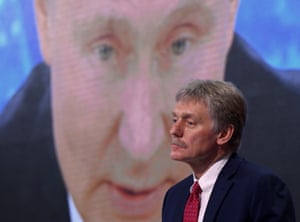
Here are some of the latest images to come out of Ukraine today.
On the outskirts of the capital, a woman looks up at the destruction of her home after a Russian missile plummeted through the roof near Brovary, Ukraine.
In the city of Kyiv, a man rides a bicycle past a statue of Grand Princess Olga, covered in sandbags.
In Mykolaiv, southern Ukraine, two people sit next to a wall of sandbags for protection against Russian shelling.
And in Odesa, a couple says goodbye before boarding the train to Przemysl, Poland.
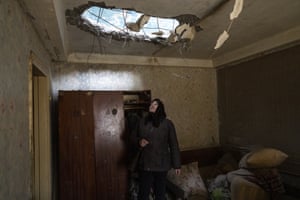
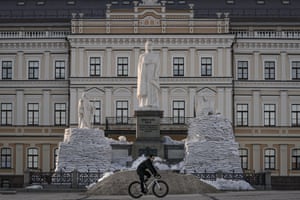
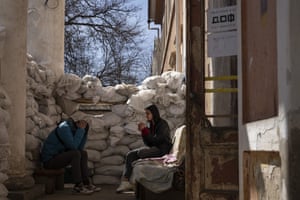
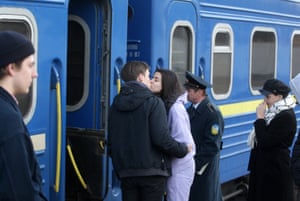
Ukraine’s military has just released its latest operational report as of 10pm this evening, claiming Russian troops are “weakened, disoriented” and “cut off from logistics and the main forces”.
“The command of the Russian occupying forces is trying to compensate for the decline in the combat potential of the enemy’s units by indiscriminate artillery fire and rocket-bomb attacks, thus destroying the infrastructure of Ukrainian cities,” officials from the general staff of the armed forces said.
Ukrainian forces “continue to maintain the circular defence of the city of Mariupol and defend and deter the advance of the enemy in the Chernihiv region,” the report added.
Ukrainian forces are also continuing to defend Kyiv and the settlements of Motyzhyn, Lisne, Kapitanivka and Dmytrivka, officials said.
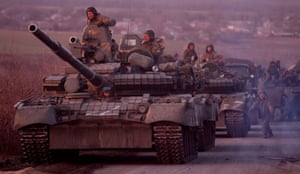
Updated
In case you missed Joe Biden’s earlier remarks regarding his comments in Warsaw, you can watch the video from his press conference below.
During an appearance in Poland at the weekend, Biden said that Russian president Vladimir Putin “cannot remain in power”, which then prompted hurried efforts by other senior figures in the administration to play down the comment in the face of international criticism.
However, Biden on Monday defended the unscripted remarks, saying it reflected his own moral outrage, not an administration policy shift.
“I wasn’t then nor am I now articulating a policy change. I was expressing moral outrage that I felt and I make no apologies,” he said. Biden added that he was “not walking anything back” by clarifying the remark. Asked whether the remark would spur a negative response from Putin, Biden said: “I don’t care what he thinks ... He’s going to do what he’s going to do”.
Putin is resorting to 'desperate measures' by abducting innocent civilians, Truss says
Britain’s foreign secretary has accused Putin’s forces of abducting innocent civilians, describing the move as an “abhorrent tactic”.
Ukrainian human rights group, ZMINA, claimed to have identified dozens of individuals who had been abducted, with thousands more deported to Russia.
Liz Truss condemned the “abhorrent tactic” and said Putin was resorting to “desperate measures” in statements released by PA Media.
Putin continues to use abhorrent tactics against the Ukrainian people, including abducting innocent civilians.
He is not achieving his objectives and is resorting to desperate measures.
Putin must fail in Ukraine.”
Truss, in a statement to the House of Commons, later told MPs: “We know that Putin is not serious about talks, he is still wantonly bombing innocent citizens across Ukraine and that is why we need to do more to ensure that he loses and we force him to think again.
We must not just stop Putin in Ukraine but we must also look to the long term. We need to ensure that any future talks don’t end up selling Ukraine out or repeating the mistakes of the past.”
ZMINA’s chief Tetiana Pechonchyk said: “Russia is detaining and disappearing civilians in an attempt to break the spirit of the Ukrainian people.
Today we are publishing our first list of those who have been taken so the Kremlin knows the world is watching and will not allow them to come to harm.
In total we have so far documented 39 cases of enforced disappearances and arbitrary detentions in the Ukrainian territories newly occupied by Russia.”
Updated
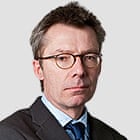
Patrick Wintour
Britain should use its leading role in the Ukraine war urgently to repair its relations with the EU by offering to help strengthen European security both via Nato and rapidly evolving EU defence plans, the director of Chatham House, Dr Robin Niblett, has proposed.
That will require working more formally with Brussels on foreign policy and defence, including issues such as cyber, intelligence and disinformation, said Niblett, who heads Britain’s leading foreign policy thinktank.
He said the move would not only strengthen Europe following “Vladimir Putin’s decision to rip up the post-cold war security arrangements in Europe”, but help indirectly to repair EU-UK economic trade relations.
Read the full story by the Guardian’s diplomatic editor, Patrick Wintour, below.
Amnesty International also accused Russia of committing war crimes in the Ukrainian port city of Mariupol.
The human rights organisation said it will soon release an in-depth report on the devastation caused by Russia’s assault on the city on the Sea of Azov. Amnesty’s Secretary-General Agnes Callamard made the announcement in a press conference in Johannesburg, as reported by the Associated Press.
The siege of Mariupol, the denial of humanitarian evacuation and humanitarian escape for the population, and the targeting of civilians, according to Amnesty International’s investigation, amounts to war crimes.”
The crisis in Ukraine right now, the invasion ... is not just any kind of violation of international law. It is an aggression. It is a violation of the UN charter of the kind that we saw when the US invaded Iraq.”
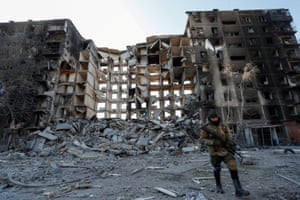
Updated
Russia’s assault on Ukraine is “a repetition of what we have seen in Syria,” Amnesty International has said.
Agnes Callamard, secretary general of the global rights watchdog, told Agence France-Presse:
What is happening in Ukraine is a repetition of what we have seen in Syria.
We are in the midst of deliberate attacks on civilian infrastructure,” she said, accusing Russia of turning humanitarian corridors into ‘death traps’.
We see the same thing [in Ukraine], just as Russia did in Syria”.
Amnesty’s director in Eastern Europe and Asia, Marie Struthers concurred, telling a separate briefing in Paris that researchers in Ukraine had “documented the use of the same tactics as in Syria and Chechnya, including attacks on civilians and the use of arms prohibited under international law.
Comparing the besieged city of Mariupol, to Syrian city of Aleppo, bludgeoned by President Bashar al-Assad, with the help of Russian airpower, Callamard said the rights lobby group’s “observation at this point, is a rise in war crimes,” she said.
Russia was the main backer of the Syrian governments in the war that erupted in March 2011.
'Fear always makes you an accomplice,' Zelenskiy warns
Wrapping up his late-night address, Zelenskiy urged other countries to act with courage.
Ukrainians should not die just because someone cannot find enough courage to hand over the necessary weapons to Ukraine.
Fear always makes you an accomplice.
If someone is afraid of Russia, if he or she is afraid to make the necessary decisions that are important to us, in particular for us to get planes, tanks, necessary artillery, shells, it makes these people responsible for the catastrophe created by Russian troops in our cities, too.
Because if you could save, you had to save.”
Updated
Weak sanctions creates 'dangerous illusion' for Russia, Zelenskiy says
Finally, Zelenskiy delivered some emphatic lines regarding sanctions imposed on Russia.
Ukraine cannot and will not agree with the passive sanctions position of some entities towards Russia. There should be no ‘suspended’ sanctions packages - that if the Russian troops do something, then there will be some answer...
We went through this story last year when we said that strong preventive sanctions against Russia were needed to prevent an invasion. The preventive package was not made. A full-scale war has begun.
There are now many hints and warnings that sanctions will be tightened, such as an embargo on Russian oil supplies to Europe, if Russia uses chemical weapons. There are simply no words.”
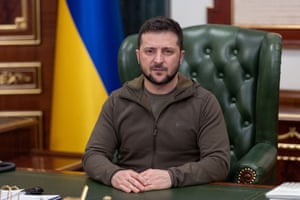
Zelenskiy continued to claim a tightening of sanctions now depends on Russia’s use of chemical weapons.
Just think about what it all came down to. Waiting for chemical weapons... We, living people, have to wait… Doesn’t everything that the Russian military is doing and has already done deserve an oil embargo? Don’t phosphorus bombs deserve that? Do the shelled chemical production or nuclear power plant deserve that?
Zelenskiy urged for sanctions packages to be “effective and substantial”.
If the sanctions packages are weak or do not work enough, if they can be circumvented, it creates a dangerous illusion for the Russian leadership that they can continue to afford what they are doing now. And Ukrainians pay for it with their lives. Thousands of lives.”
The Ukrainian president announced he would be creating a group of experts at the President’s Office - Ukrainian and international, who will “constantly analyse the sanctions against Russia” and what they influence.
Our goal is for the sanctions to work as intended. And so that there is no possibility to circumvent them. This must be a goal for the whole democratic world, without exception. No exception...
No one has the right to use the lives of Ukrainians to save any income in Russia or income common with Russia.”
Updated
Zelenskiy also described a “very active diplomatic day” after speaking with British prime minister Boris Johnson, Canadian prime minister Justin Trudeau, German Chancellor Olaf Scholz, Italian prime minister Mario Draghi and the president of Azerbaijan Ilham Aliyev.
We agreed with Britain to further support our defence and strengthen sanctions against the Russian Federation.
Canada also supports a tougher response from the world to the catastrophe created by Russian troops in Ukrainian cities.
In a conversation with German Chancellor Scholz, I also paid considerable attention to the need to increase sanction pressure on Russia.
Italy has agreed to become one of the guarantors of Ukraine’s security in the relevant new system of guarantees that we are elaborating.”
Zelenskiy said he will continue with talks tomorrow and during the week will speak in the parliaments of Denmark, Norway, the Netherlands, Greece and Australia.
“It is important that these are speeches not only in front of politicians, but also in front of societies,” he said. “In front of millions of people who want to hear Ukraine and are ready to hear it to help and support. Who feel that we are fighting for our common freedom. One for all people on our Earth.”
https://www.theguardian.com/world/live/2022/mar/28/russia-ukraine-war-latest-news-zelenskiy-putin-live-updates

No comments:
Post a Comment